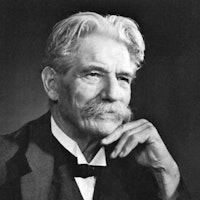If rational thought thinks itself out to a conclusion, it arrives at something non-rational which, nevertheless, is a necessity of thought.
If rational thought thinks itself out to a conclusion, it arrives at something non-rational which, nevertheless, is a necessity of thought.
Albert Schweitzer

A Necessity of Thought
Topic: Truth, Law, & Principle
If rational thought thinks itself out to a conclusion, it arrives at something non-rational which, nevertheless, is a necessity of thought. This is the paradox which dominates our spiritual life. If we try to get on without this non-rational element, there result views of the world and of life which have neither vitality nor value.
Albert Schweitzer was born on January 14, 1875, in Kaysersberg, Alsace, into a family deeply rooted in the traditions of religion, music, and education. Both his father and maternal grandfather were Lutheran ministers, and his early exposure to church life, theological study, and classical music shaped his intellectual and spiritual development. He pursued theology and philosophy at the University of Strasbourg, earning a doctorate in philosophy in 1899 with a focus on Immanuel Kant’s religious thought. In 1900, he received his licentiate in theology. His academic and pastoral work during this period included preaching at St. Nicholas Church and serving in leadership roles at the Theological College of St. Thomas. In 1906, he published The Quest of the Historical Jesus, a critical work that contributed to modern theological scholarship.
Alongside his theological and philosophical work, Albert Schweitzer was a gifted musician. He began studying piano and organ in childhood and was performing publicly by the age of nine. He went on to become an internationally known concert organist, using income from performances to fund both his education and later medical missions. As a musicologist, he published a biography of Johann Sebastian Bach in 1905 and contributed to the study of organ building and playing. In 1905, he made a pivotal decision to study medicine with the goal of becoming a medical missionary. He earned his medical degree in 1913 and soon after established a hospital in Lambaréné, French Equatorial Africa, where he and his wife later endured internment during World War I.
After returning to Lambaréné in 1924, Albert Schweitzer dedicated the remainder of his life to expanding and maintaining the hospital, which grew into a complex capable of treating hundreds of patients. He combined the roles of physician, surgeon, pastor, administrator, writer, and host, drawing on his wide range of training and experience. His written works during this time included On the Edge of the Primeval Forest and Civilization and Ethics. Schweitzer received several international honors, including the Goethe Prize and the 1953 Nobel Peace Prize. The prize money supported the establishment of a leprosarium at Lambaréné. Albert Schweitzer died there on September 4, 1965, leaving behind a legacy grounded in service, scholarship, and what he called “Reverence for Life.”
Civilzation and Ethics
Schweitzer, Albert. Civilization and Ethics. United Kingdom, A. & C. Black, Limited, 1923. Albert Schweitzer [Kulturphilosophie (1923), Vol. 2 : Civilization and Ethics].

Albert Schweitzer
Theme: Truth

About This Albert Schweitzer Quotation [Commentary]
Albert Schweitzer writes, “If rational thought thinks itself out to a conclusion, it arrives at something non-rational which, nevertheless, is a necessity of thought.” Here, Schweitzer identifies a limit within the structure of rationality itself. Thought, when fully exercised, leads not to a purely logical end, but to something beyond logic—something “non-rational” that is still required by the very process of thinking. This necessity is not a defect in rationality but part of its deeper integrity. Rather than being opposed to reason, the non-rational appears as its culmination.
This recognition brings Schweitzer to what he calls “the paradox which dominates our spiritual life.” Rational thought alone cannot account for the full range of human experience. Without this “non-rational element,” he writes, we are left with “views of the world and of life which have neither vitality nor value.” Schweitzer is not dismissing rationality but warning against its isolation. When thinking detaches from the non-rational, from what is intuitive or spiritual, it loses contact with the energy that gives thought its meaning.
In this view, truth does not end with rational conclusion but moves into what Schweitzer calls “a necessity of thought.” The process of thinking, when carried to its full conclusion, leads to something “non-rational,” yet essential. Schweitzer is clear that this is not an abandonment of reason, but a continuation of it. He writes, “If we try to get on without this non-rational element,” the result is a diminished understanding—“views of the world and of life which have neither vitality nor value.” In this framework, truth includes both what we can reason through and what we must receive without full explanation. This is “the paradox which dominates our spiritual life”: that reason itself leads to what transcends reason, and this movement is required for our views to hold meaning.
Additional Quotes from Albert Schweitzer
Related Quotes
Copyright © 2017 – 2026 LuminaryQuotes.com About Us